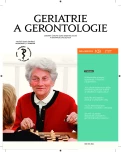Home-based care for patients with dementia in the context of burden on non-expert/non-professional caregivers
Authors:
PhDr. Ph.D. Iveta Ondriová; PhDr. Ph.D. Terézia Fertaľová
Authors‘ workplace:
Prešovská univerzita v Prešove, Fakulta zdravotníckych odborov, Katedra ošetrovateľstva
Published in:
Geriatrie a Gerontologie 2014, 3, č. 1: 40-43
Category:
Original Article/Study
Overview
Dementia includes a group of diseases, which result in the decline of cognitive functions, especially memory, thinking, orientation, comprehension, reasoning, learning skills, numeracy, language and judgment. According to the level of disability, the patient depends to various degrees on his or her caregiver(s), who is usually the patient relative. The goal of our research was to map the level of nursing burden on families providing care for a sick relative with dementia. The investigation was carried out using non-standardized questionnaire for the local non-professional caregiver respondents (numbering 60) in the Presov region, which was supplemented by standardized questionnaires – Instrumental daily activities test - IADL, Activities in daily living ADL, Test of nursing burden according to Svanborg. The results of the research indicate the noticeable impact of the burden of caring for a dementia patient on the caregiver and on their psychological aspects.
Key words:
Dementia – patient – caring for a sick relative – family – rate of burden – caregiver burden
Sources
1. Staňková M: Hodnocení a měřící techniky v ošetřovatelské praxi. České ošetřovatelství 6. Brno: IPVZ 2001. 55 s.
2. Bártlová S: Sociologie medicíny a zdravotnictví. 6. vyd. Praha: Grada Publishing 2005.
3. Tošnerová T. Pocity a potřeby pečujících o starší rodinné příslušníky. Průvodce pro zdravotníky a profesionální pečovatele. Praha: Ambulance pro poruchy paměti 2001. 68 s.
4. Kebza V, Šolcová I: Syndrom vyhoření. 2. vyd. Praha: Státní zdravotní ústav. 2003. s. 123.
5. Elmstahl S et al.: Family Caregivers‘ subjective experiences of satisfaction in dementia care: aspects of burden, subjective healt and sense of coherence. Nordic College of Caring Sciences 2005; 19 : 157–168.
6. Jeřábek H a kol.: Rodinná péče o staré lidi. 1. vyd. Praha: CESES FSV UK 2005. 99 s.
7. Rešetková D: Je úžasné niekam patriť. Familia: kultúrno-spoločenský magazín pre rodiny 2008; 24(3): 13.
8. Pidrman V: Demence. Praha: Grada Publishing 2007, 183 s.
9. Topinková E: Péče o staré v rodině. Lze identifikovat rizikové rodiny s vysokou mírou pečovatelské zátěže? Praktický lékař 1995; 75(7–8): 366-369.
10. Stoltz P et al.: Support for family carers who care for an elederly person at home – a systematic literature review. Nordic College of Caring Sciences [online] 2004; 18(9): 111–119. [cit. 2007-10-10]. Dostupné na www.caregiver.org.
11. Snopková I: Burn-out syndrom čili syndrom vyhoření. Sestra 2007;17(7–8): 37–38.
Labels
Geriatrics General practitioner for adults Orthopaedic prostheticsArticle was published in
Geriatrics and Gerontology

2014 Issue 1
- Advances in the Treatment of Myasthenia Gravis on the Horizon
- Memantine in Dementia Therapy – Current Findings and Possible Future Applications
- Memantine Eases Daily Life for Patients and Caregivers
- Possibilities of Using Metamizole in the Treatment of Acute Primary Headaches
- Metamizole at a Glance and in Practice – Effective Non-Opioid Analgesic for All Ages
-
All articles in this issue
- Home-based care for patients with dementia in the context of burden on non-expert/non-professional caregivers
- The issue of arterial hypertension in questions and answers
-
Jsou cílové hodnoty pro léčbu arteriální hypertenze odlišné ve středním a vyšším věku?
Co říkají klinické studie, guidelines a jaká jsou současná doporučení pro klinickou praxi. - Specific clinical features of late-onset rheumatoid arthritis
- Prevention and management of instability and falls in geriatric patients
- Use of mobility aids in decubitus patients in selected facilities in The Czech Republic and Germany
- Social background of elderly patients with mental disorders – a comparison between 2003 and 2013
- Geriatrics and Gerontology
- Journal archive
- Current issue
- About the journal
Most read in this issue
- The issue of arterial hypertension in questions and answers
- Specific clinical features of late-onset rheumatoid arthritis
- Prevention and management of instability and falls in geriatric patients
- Home-based care for patients with dementia in the context of burden on non-expert/non-professional caregivers
